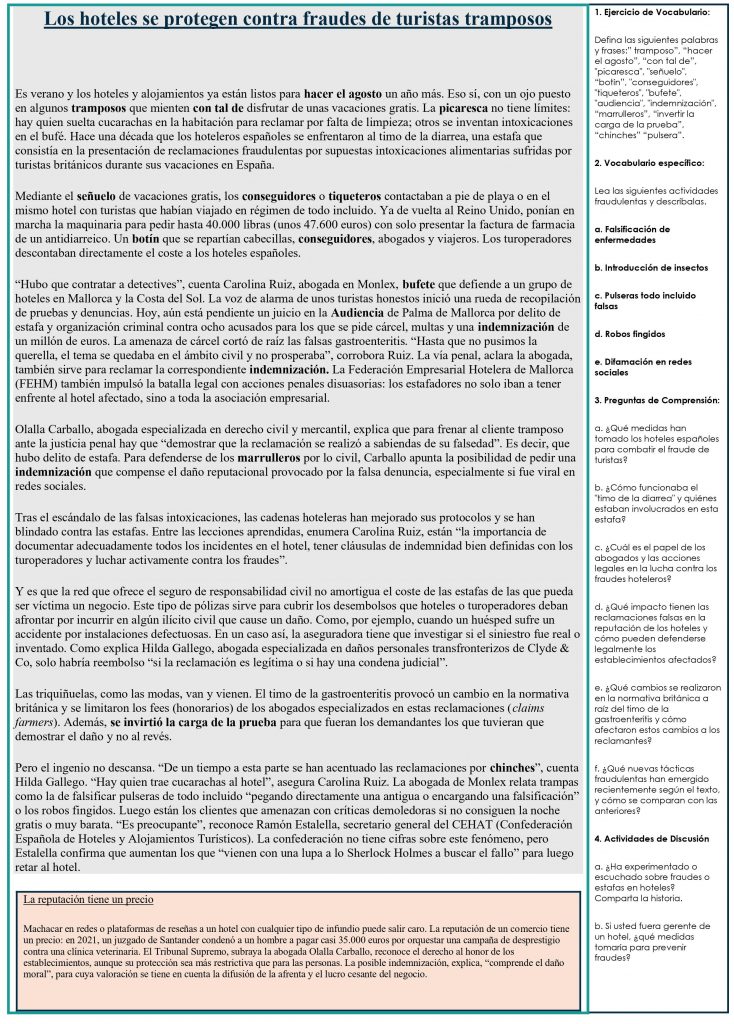Las expresiones del día: “Ofrecer Prueba” y “Producir Prueba”
In legal proceedings, the terms “ofrecer prueba” and “producir prueba” are crucial in the process of presenting and validating evidence.
Ofrecer Prueba: This term refers to the stage in a legal case where a party formally proposes to present certain pieces of evidence to support their claims. It involves identifying and listing the evidence that one intends to use, which could include documents, witness testimonies, expert reports, or physical items. The purpose is to inform the court and the opposing party about the evidence that will be relied upon during the trial. The noun is ofrecimiento de prueba.
Producir Prueba (Evacuar Prueba in Mexico): Once evidence has been offered, it must be produced or presented in court. This involves bringing the evidence before the judge or jury, allowing for its examination and validation. This ensures that the proposed items are available for scrutiny and can be challenged or corroborated by the opposing party. This step is critical in substantiating the claims made in a legal argument. The noun is producción de prueba (evacuación de prueba).
In a nutshell:
• Ofreciemiento de Prueba sets the stage by indicating what evidence will be used.
• Produccción de Prueba brings the evidence into the courtroom, making it a tangible part of the case. dc
La expresión del día: Derecho de Amparo
If you explore the vast landscape of the Spanish language, amparo might be defined as ‘protection‘ or ‘shelter‘. However, in the realm of Legal Spanish, it navigates deeper waters. A masculine noun (el/un amparo), its origins can be traced back to the Latin “amparare”, which denotes ‘to protect’. In the English legal context, the closest equivalent might be “writ of protection” or “constitutional remedy”. In Legal Spanish, derecho de amparo refers to the right of protection against any act or omission of public authorities or individuals which violates the fundamental rights and guarantees established by the Constitution. This is a pillar of the justice system in many Latin American countries, ensuring that the basic rights of individuals aren’t trespassed upon. In Mexico, for instance, the juicio de amparo is a constitutional process that protects the fundamental rights of individuals against acts of any authority. It’s like an armor, safeguarding the liberties of the citizenry. And here, we uncover another term: ampararse, a verb which means to seek or request this very protection. If someone feels that their fundamental rights are being violated, they can ampararse, invoking this legal protection against potential harm. In essence, derecho de amparo is the legal system’s way of ensuring a checks-and-balances mechanism, ensuring that power isn’t absolute and individuals can find refuge in the constitution when they feel threatened. Just as the term tipo is foundational in understanding criminal law, amparo is key to fathom the ways in which individual rights are upheld in the face of potential infringement. Consider this: In the age of digital transformation and cyber activities, what happens when a government entity invades the digital privacy of an individual? In several Latin American nations, the individual can invoke derecho de amparo to challenge this intrusion, ensuring that even in the digital sphere, fundamental rights are sacrosanct. A historical nugget: During the 19th century, various Latin American nations, inspired by the French and US constitutional doctrines, adopted the derecho de amparo as a means to fortify their newly formed republics against potential autocratic rule. It was, and remains, a beacon of hope, a legal tool that ensures the promise of liberty isn’t just a written word but an actionable right. My Constitutional Law professor often remarked that the ‘Derecho de Amparo’ is like Habeas Corpus, but for all constitutional rights other than personal freedom. dc
LA PALABRA DEL DÍA: AGRAVIO
When delving into the vast domain of Legal Spanish, the word agravio stands out as an intriguing term. Directly translated to English, agravio means ‘grievance,’ ‘affront,’ or ‘insult.’ But within the legal lexicon of Spanish-speaking countries, its meaning expands considerably.
This word has its origins in the Latin term gravāre, which means ‘to weigh down’ or ‘to burden’. It captures the essence of causing harm or placing an undue burden upon someone.
In the legal realm, agravio is often used in contexts like agravio comparativo, which can be likened to ‘comparative grievance’ or ‘discrimination.’ It is used to describe a situation where a person or group is treated less favorably than another in a comparable situation without justification. The term holds significant importance in areas of law such as labor, civil rights, and equality legislation.
Taking an example from Spain, in 1883, the Segundo Congreso Catalanista presented a memorial to the King Alfonoso XII that speaks of the rectification of “historical grievances” (agravios históricos). This alludes to past actions or decisions that were perceived as unfair or discriminatory against Catalonia, underscoring the depth and weight the term agravio holds within various legal and societal contexts.
Another derivative of this term is agravios no reparados, which can be seen in some Spanish legal codes, indicating “unredressed grievances“. These are instances where the harm or grievance has not been rectified or compensated.
Diving into a historical application of agravio: In 17th century Spain, an infamous case involved a nobleman who felt “agraviado” (aggrieved) when another noble falsely accused him of theft. The accuser, realizing his mistake, sought to rectify the situation. However, the aggrieved party believed that a mere apology would not suffice to address the agravio he suffered. This case was foundational in shaping the legal and societal understanding of the gravity and ramifications of agravio.
As we navigate the labyrinth of Legal Spanish, it becomes clear that understanding terms like agravio is not just about dictionary definitions but also about comprehending the cultural, historical, and legal contexts in which they are placed. Like tipo, the word agravio underscores the unique intricacies of the Spanish legal system and its rich tapestry of history and societal norms. dc
La economía española
Practique el vocabulario, escuche el audio sobre la economía española y haga la tarea que le sigue sobre el texto que escuche:
La expresión del día: Derechos Reales
In Legal Spanish, “Derechos Reales” is a term used in the legal system to refer to a set of rights that are granted to individuals or entities over a particular asset or property. These rights are called “real” because they are directly related to rights over things (res in Latin.
The concept of “Derechos Reales” is similar to the concept of “property rights” in common law systems, but it includes a wider range of legal rights that can be granted over a property. In Spanish and Latin American legal systems, these rights are specifically defined in codes which establishe the legal framework for rights over things.
Some examples of “Derechos Reales” in our legal systems include:
Propiedad: This is the most complete and absolute right that can be granted over a property. The owner of a property has the right to use, enjoy, and dispose of it freely, as long as this does not infringe on the rights of others.
Usufructo: This is a right that allows a person to use and enjoy a property that belongs to someone else, without owning it. The holder of the usufruct has the right to use and enjoy the property as if they were the owner, but they cannot sell or dispose of it. The owner keeps the nuda propiedad: naked ownership. My opinion is that usufructo is the closest legal institution we have to what in England is called leasehold.
Servidumbre: This is a right that allows a person or entity to use an immobile thing (real estate) in a particular way, even if they do not own it. For example, a person may be granted a servidumbre to use a private road that runs through someone else’s property.
Hipoteca: This is a right that a lender can claim over a property as security for a loan. If the borrower defaults on the loan, the lender has the right to foreclose on the property and sell it to recover the debt.
Derecho de Superficie: This is a right that allows a person or entity to use and occupy the surface of a property for a specific purpose, such as building a structure or conducting mining activities.
These are just a few examples of the different types of “Derechos Reales” that can be granted over a thing. Each of these rights is subject to specific legal requirements and limitations, and they can be transferred, inherited, or revoked under certain circumstances.
Overall, “Derechos Reales” play an important role in the Spanish and Latin American legal system, as they allow individuals and entities to exercise a degree of control over a particular asset or thing, while also protecting the rights of other parties who may have an interest in the same thing.
La palabra del día: Solvente
Adjective. Able to respond to an economic debt or take charge of an obligation. E.g.: Escrivá defiende que la Seguridad Social es “solvente” y reconoce la falta de personal: Escrivá stresses that the public pension system is “solid and solvent”.
The noun is la solvencia. E.g.: Motivos que dificultan la concesión de una hipoteca ajenos a la solvencia: Reasons that make it difficult to grant a mortgage other than solvency. The verb is solventar. E.g.: Para poder solventar los gastos de la vivienda, subalquilaba dos habitaciones: To be able to afford the apartment she sublet two rooms.
In another note, solvente, as a noun, means solvent; the liquid in which a solid is dissolved to form a solution. I used to deal with it a lot when I was a child and ‘helped’ my father with his job as a carpenter to remove paint from wood. dc
La palabra del día: Coacción
Feminine noun. This term has two interrelated meanings: 1. Force or violence done to someone to force him/her to say or do something; 2. legitimate power of the Law to enforce compliance or prevail over its infringement. E.g.1: La acusación debe demostrar sus argumentos sin recurrir a pruebas obtenidas por coacción o por fuerza: The prosecution must prove its case without resort to evidence obtained through coercion or oppression. E.g.2: De hecho, el Estado central tiene menos poder de coacción en las regiones porque éstas se autofinancian y no siempre tienen…: Indeed, the central State has less coercive power in the regions because they are self-financed and do not always have the…
The adjective is coactivo/a, and the adverb coactivamente.
When I moved to Rome from Argentina in 2001, one of the first words from romanesco I learned was coatto. Thanks to my knowledge of Legal Spanish, I immediately guessed its meaning: a bully. Study legal Spanish with me and you will not just learn, you will also open your mind. dc











